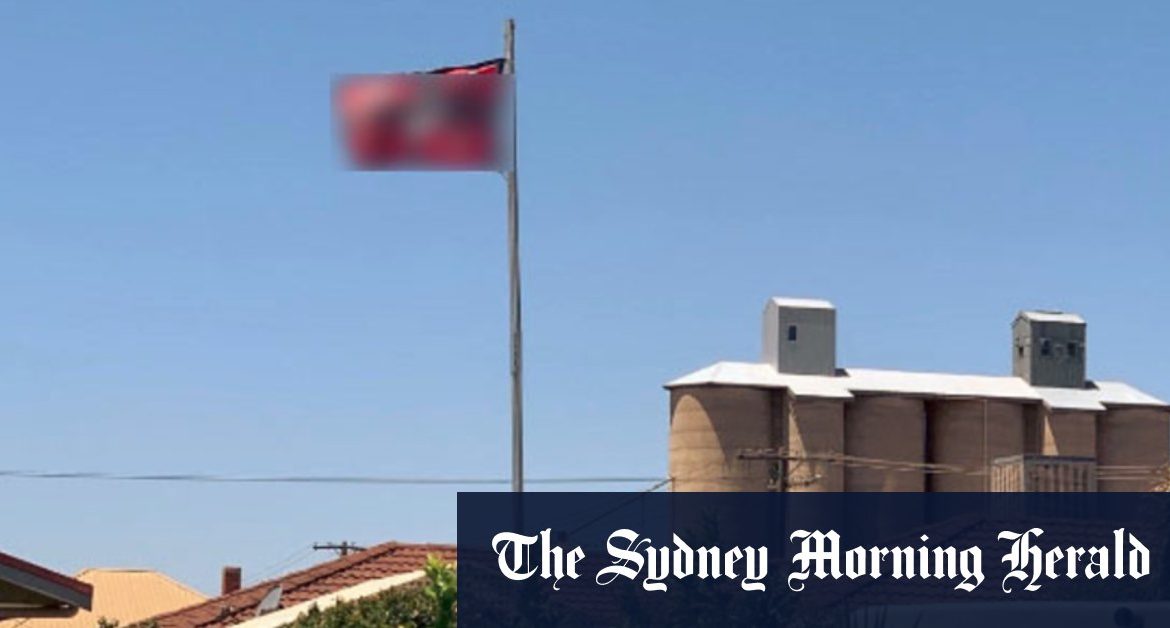Speaking on Tuesday, Mr Andrews signalled the government was ready to take action against the use of the symbols. “There’s no place for those views, there’s no place for those symbols, there’s no place for those attitudes and conduct in a modern Victoria,” he said.
The committee – consisting of three Labor MPs, two Liberals and two independents – recommended a prohibition on symbols of Nazi ideology except for situations in which the use was acceptable, for example in education settings.
It also encouraged the government to “monitor the public display of other hateful symbols to determine whether a broad-based offence should be established.”
Stills from a video of an alleged attack on a Channel Nine security guard.
Anti Defamation Commission chairman Dr Dvir Abramovich, who has been campaigning for a ban on the swastika, said the report’s recommendation was a “triumph” for Holocaust victims.
“This is a thunderous day for the history books that will not be denied, and a resounding defeat of those agents of evil who seek to keep Hitler’s legacy alive,” Dr Abramovich said. “Over the din of hatred, through this report, we can hear the ideals of equality and freedom ring loud.”
Alex Ryvchin, co-chief executive of the Executive Council of Australian Jewry, said new legislation would be an effective “tool in countering the rise of neo-Nazism … and provide welcome recourse against those who brandish the swastika in public to harass, intimidate and denigrate others”.
“Any banning legislation would need to acknowledge that hate symbols used by extremist groups are constantly evolving. While the specific wording of the legislation will require considerable care and attention to ensure its efficacy, we certainly support the spirit of what is being done here,” he said.
Multiple incidents involving neo-Nazis have been in the news this year. Over the Australia Day weekend, dozens of members of the far-right National Socialist Network burnt a cross – a ritual usually associated with the Ku Klux Klan – next to Lake Bellfield at the foot of the Grampians in western Victoria.
Thomas Sewell, a former Australian Defence Force member who is one of the Network, attacked a security guard outside the offices of The Age and A Current Affair hours before the TV program aired a segment on Mr Sewell’s right-wing group. The man has since been arrested by police after almost a day on the run.
The committee inquiry was initially prompted by Reason Party MP Fiona Patten’s draft laws that would widen the Racial and Religious Tolerance Act to outlaw hate speech targeting people for their gender, disability, sexual orientation or gender identity. The law currently covers racial and religious vilification. The committee’s scope eventually expanded to examine Nazi symbolism.
Ms Patten said in January that an outright ban of the swastika could be unworkable because some people collect military memorabilia without sinister intent.
“It’s how you use it,” she said in relation to controversial anti-Israel academic Tim Anderson’s superimposing of a swastika on the flag of Israel in teaching material.
The committee also recommended:
- Victorian Legal Aid and the Aboriginal Legal Service engage in “strategic litigation” in the field of vilification to build up expertise.
- Reforming the current criminal offence of “serious vilification” to simplify and lower the thresholds.
- Reviewing maximum penalties for serious vilification and review the requirement for the Director of Public Prosecutions to provide written consent before commencing prosecution for serious vilification.
- Reducing the threshold for the civil incitement test from “conduct that incites” to “conduct that is likely to incite”.
- Establishing a new civil harm test to “assess harm from the perspective of the target group” and make unlawful conduct a reasonable person would consider “hateful, seriously contemptuous, reviling or seriously ridiculing.”
- Considering, in consultation with LGBTI and religious groups, narrowing the religious exception in state anti-vilification legislation and add the word “genuine” to any public interest defeingnce.
- Working with commonwealth and other jurisdictions to create referral mechanisms for human rights agencies and bodies like Esafety Commissioner; encourage social media platforms to adopt “jurisdiction verification tools”; and create a legal framework for enforcement agencies to handle online vilification.
Liberal MP James Newbury, who sat on the committee, said the Victorian government should immediately outlaw Nazi symbolism. “Daniel Andrews words are hollow. We need action now,” he said.
Paul is a Victorian political reporter for The Age.
Most Viewed in National
Loading







